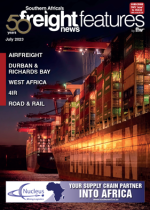In an era of expanding economies and globalised trade, the air cargo industry is witnessing a remarkable surge in demand across diverse sectors. From mining and oil and gas to healthcare, businesses were increasingly relying on air cargo services’ speed, efficiency and reliability to transport their goods and meet the demands of a rapidly evolving marketplace, said Jenny van Wyk, country manager for South Africa at Chapman Freeborn.The aircraft charter specialist saw a 30% year-on-year increase in cargo revenues in the region from 2021 to 2023, leading to its decision to triple the size of its Africa team.“Our revenues in Africa have risen significantly over the past three years. This growth can be attributed to several factors, including increased demand for air cargo services across the continent, our ability to provide innovative and f lexible solutions to our clients, and our commitment to building strong relationships with our partners across Africa,” said Van Wyk. “As African economies grow and diversify, we expect this trend to continue. Furthermore, our ability to provide tailored solutions to meet each client's needs has been a key driver of our revenue growth.”Van Wyk says there’s a growing demand for time-sensitive air cargo services in particular. “A s A f r i c a n economies continue to grow and d iversif y, more and more companies are looking for fast and efficient ways to move their goods across the continent. This has increased demand for express air cargo services that can deliver goods quickly and reliably.”Another trend they see is an increased focus on safety and security in the air cargo industry. With the rise of global threats, including terrorism and the spread of infectious diseases, clients were increasingly looking for air cargo providers that can offer secure and safe transport solutions, said Van Wyk. “This has led to a growing demand for air cargo providers with robust security measures in place, including secure facilities, advanced screening technologies, and trained security personnel.”She said there was also a move towards greater collaboration and partnerships in the air cargo industry at large. “As competition intensifies and clients demand more complex and customised solutions, air cargo providers are increasingly partnering with each other and with other stakeholders in the supply chain to deliver end-to-end solutions. This trend towards collaboration is helping to drive innovation and is enabling us to deliver even more value to our clients.”According to Van Wyk, a deep knowledge of the African market, as well as expertise, are essential for success on the continent when it comes to finding cost-effective and efficient solutions. “We face several challenges in the African market, one of the biggest being the lack of adequate infrastructure across many parts of the continent. This includes limited airport capacity, inadequate ground handling facilities, and poor road networks. These infrastructure gaps can lead to delays, higher operating costs, and other logistical challenges.”She said another challenge was the complexity of regulations across different African countries. “Each country has its regulatory framework; navigating these can be difficult and time-consuming. We work hard to comply with all regulations and maintain the necessary licences and permits to operate in each country.”

